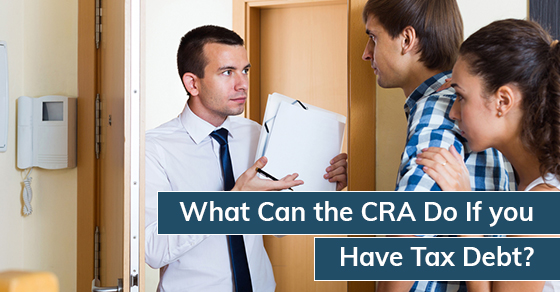
What Can the CRA Do If you Have Tax Debt?
There are many ways you might end up owing tax to the Canada Revenue Agency (CRA). They collect not only individual and corporate income tax but also track other payments including payroll deductions, GST/HST remittances, benefit overpayments such as Canada child benefits and CPP. Once you submit your income tax or any other business-related taxes, the government will check your submission to determine if you have made the right deductions, payments and accurate information.
Their assessment can find that you either still owe money, or that they have made an overpayment for one of their programs. Other areas include defaulted student loans, Employment Insurance discrepancies and CPP overpayments. If you fail to pay, CRA collections will take over, using many tactics to get their money.
First Steps for Collection
Should the CRA notify you that you owe money based on their assessment you can either dispute it and provide proof they are in error or pay the amount they say you owe. If you fail to pay in what they view as a timely manner the collection process can begin. Their goal is to get you to pay in full or set up a payment plan that allows you to pay off your tax debt over an agreed upon period. They can also request you provide proof your payments are the highest you can afford, which will mean providing them with wage statements, bank balances, and household expenses.
CRA Collection Process
If you fail to make payments the CRA can use several tactics to collect their money including:
- Taking any tax refunds they owe you in subsequent years and apply it directly to your tax debt
- Certifying your debt by registering it in Federal Court, which is usually done prior to placing a lien on your home or other property you own
- Although uncommon, in some cases they can choose to seize assets such as your home, cars, boats, etc. to raise money towards the balance owed
- Your wages can also be garnished, which means they will instruct your employer to deduct more taxes from your income
- If you owe money such as GST/HST for your business, they can come after you or directors of your company for money
Joint Assets
If you are a joint owner of a property the CRA cannot try to seize that property to pay off your tax debt, unless you live in Quebec. If you transferred ownership or added joint ownership after your tax debt was incurred, they can try to collect taxes not only from you but also the joint owner. This is common with jointly owned properties for spouses.
Interest and Penalties
It is important to keep in mind that the CRA will also apply penalties in certain cases, as well as begin to charge interest effective by the date in which the original balance was owed. For example, if you send in your taxes by the due date, but they do an assessment and determine you owe more taxes, the interest will be applied, starting at the CRA tax submission deadline. The interest is compounded daily.
For penalties, you will usually be charged if you are continuously submitting your tax returns late. If you do this more than once, they view this as a repeat offence. Other penalties would include gross negligence penalties and failure to report income. Keep in mind that penalties added to your tax debt will also be charged interest.
To find out more about what the CRA can do if you owe them money, call Charles Advisory Services at 416-915-9007 or contact us here.

Leave A Comment